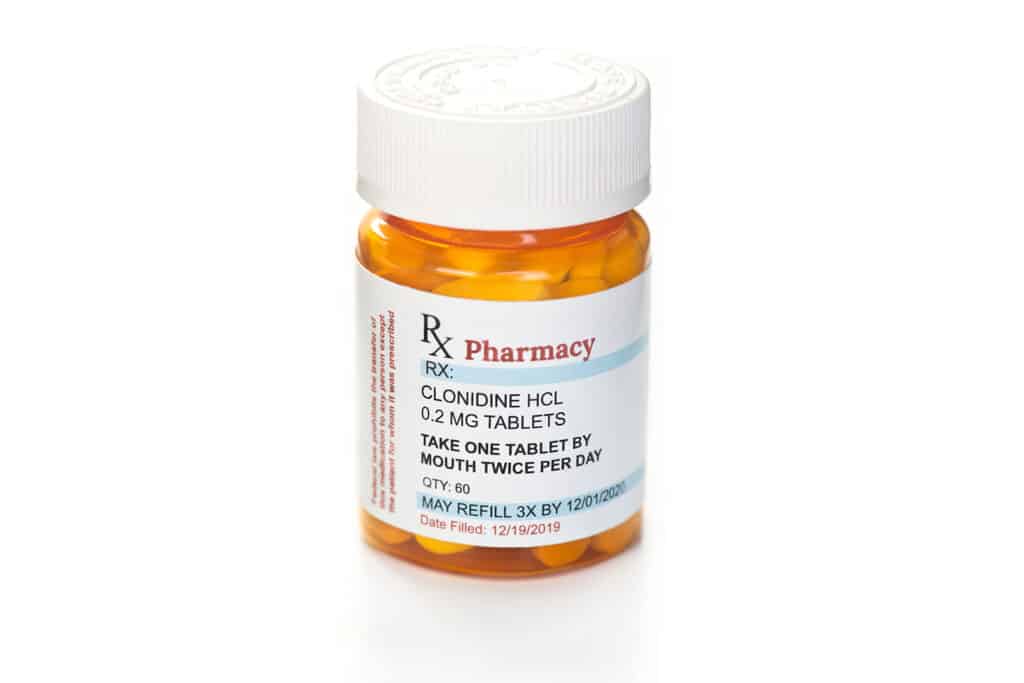Anxiety is one of the most common and debilitating mental health issues worldwide. While anxiety does have a beneficial function in ensuring that we stay safe from danger and make decisions that don’t harm us, unhealthy amounts of anxiety, either daily or triggered by specific circumstances, only cause unnecessary harm and negatively affect the lives of millions of people of all ages and backgrounds across the world. There are numerous medications available to help alleviate symptoms of anxiety. One of the most effective of these medications is clonidine.
Table of Contents
What is Clonidine?
Clonidine hydrochloride is primarily a hypertension medication, usually shortened to clonidine or referred to by the brand name Catapres. It works by decreasing the amounts of norepinephrine in your body. Norepinephrine is a neurotransmitter that controls stress responses by increasing your heart rate and blood pressure in response to what we perceive as potentially dangerous situations. The lower amounts of norepinephrine in your body that occurs as a result of clonidine allow your blood vessels to relax more quickly and lower your heart rate. While hypertension is the primary condition for which clonidine is prescribed, many doctors have found that the drug also has excellent benefits in treating other conditions such as ADHD, insomnia, PTSD, migraines, Tourette’s syndrome, and anxiety disorders.

Anxiety and hypertension go hand-in-hand. People who suffer from anxiety problems are at a higher risk of developing hypertension since the condition increases blood pressure, and many people who have hypertension struggle with feelings of anxiety. The effects of clonidine work to combat the effects of both conditions at once.
Is Clonidine Effective at Treating Anxiety?
Many people suffering from anxiety disorders have experienced great results after taking clonidine. Studies have shown that clonidine reduces anxiety symptoms in most users, particularly in the frequency of anxiety attacks and the non-physical symptoms such as feelings of dread, nervousness, excessive worrying, difficulty relaxing, irritability, and mood swings.
Public response to clonidine treatments for anxiety has also been largely positive, with over 60% of users reporting a decrease in symptoms and an improvement in their daily lives. Like any other medication, it doesn’t work for everyone. Every person’s body and mind are different, and what might work for most patients might not work for others. However, clonidine has proven to be one of the more effective medicinal treatments for anxiety that has been developed so far.
How Do You Use Clonidine?
First of all, as with any prescription medication, it’s essential to only take clonidine if it’s been prescribed to you by a doctor. Never take medication belonging to other people since it may be harmful depending on your personal medical history and condition.
Second, follow the dosage instructions for your prescription strictly. Your psychiatrist will start you on a very low dosage, taken around once a week, and gradually increase your dosage depending on how you react to it. On average, when taken at normal dosage levels, most patients take clonidine twice daily, once in the morning and once in the evening. Because the tablets are extended-release, you must take the tablets whole. You cannot cut the pills into pieces or crush them.
Clonidine comes in either oral tablets or patches. Your psychiatrist will make suggestions on which they believe is better for your particular situation. Patches can be stuck almost anywhere you prefer on your body, but the best effects are usually experienced when the patch is placed on the chest or arm. Patches are usually applied once a week on a clean patch of skin. They should be disposed of in a sealed container or bag to avoid pets or children being exposed to the medication.

Finally, if you notice you are experiencing adverse side effects or allergic reactions, contact your therapist or seek medical attention as soon as possible.
If the side effects you’re experiencing are so severe that you believe it’s best to get off the medication, contact your doctor as soon as possible. When you stop taking clonidine after being on it for an extended period, you will likely develop potentially dangerous withdrawal symptoms after you suddenly stop taking it. If your doctor agrees that you should be taken off of the medication, they will help wean you off of it slowly and safely.
Should you accidentally overdose on clonidine, you need to be aware of the signs to prevent suffering from severe adverse effects or possibly life-threatening reactions. The strongest symptoms of overdosing are difficulty breathing, cold sweats, confusion, a drastic drop in blood pressure, weakness, severe drowsiness, slurred speech, and shivering. If you start experiencing any of these symptoms, contact emergency medical services as soon as possible.
What are the Side Effects?
The most commonly experienced side effects of clonidine are usually very mild. These common side effects include dry mouth, fatigue, headache, nausea, drowsiness, constipation, fever, weakness, and irritability.
Some less common but moderate side effects include vomiting, abdominal pain, and diarrhea.
Severe side effects are rare, but you should seek immediate medical attention when you experience them. These side effects include rash, hives, difficulty breathing or swallowing, constricted pupils, and swelling in the face, throat, hands, or feet.
What Drugs Interact with Clonidine?
If you are currently taking any other medications, or if you start taking a new medication while you’re on clonidine, notify your doctor immediately to ensure that you avoid any adverse drug interactions. The drugs that have been shown to interact poorly the most with clonidine are antidepressants, sleep aids, muscle relaxants, alcohol, antipsychotics, and beta-blockers.
Contact Recreate Life Counseling today if you’re suffering from anxiety and need help. Not only will the professionals at Recreate Life Counseling be able to help you with your anxiety, but they’ll also be able to help you recover from mental health conditions contributing to your anxiety, such as drug and alcohol addiction. They utilize a wide variety of therapies and medical care for all your individual needs to ensure that your road to recovery is as smooth as possible.
Published on: 2022-10-31
Updated on: 2025-04-29



